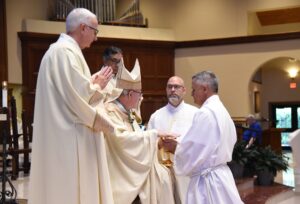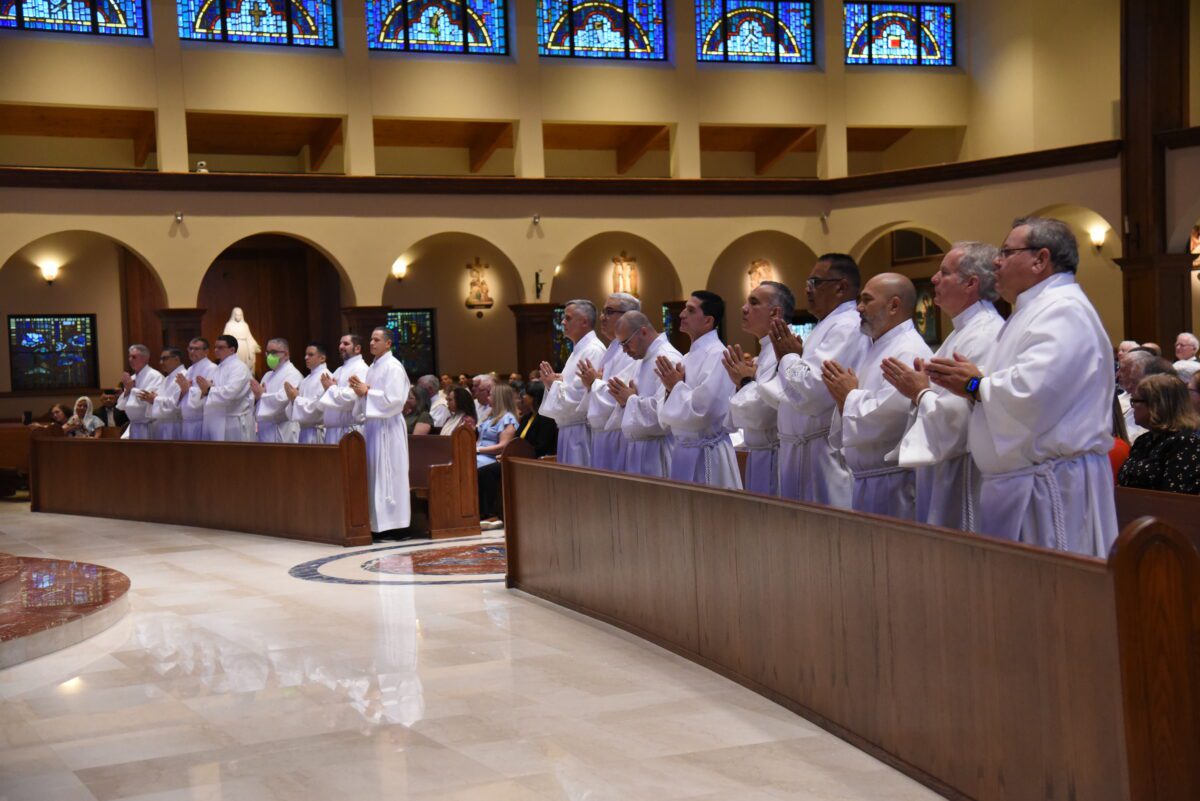ALTAMONTE SPRINGS | At the Institution of the Rite of Acolyte, Oct. 7, Bishop John Noonan called forward 18 men in formation for the diaconate. This day at Annunciation Parish marked the last major step on their journey to Ordination. They were there to accept their greatest responsibility yet, that of caring for the sacred vessels to be used in the consecration of bread and wine, becoming the Lord and Savior, and committing to being Ministers of Holy Communion forever.
“You must become the bearer of Christ in the Eucharist to surround the people with the love of God. Then and only then can we say we are not afraid because God is with us,” Bishop Noonan told them. “It’s a journey of faith. It’s a journey of hope and sometimes difficulties. Yet that’s the story of life and the story of who we are in relationship to God. There are always ups and downs… there are moments above all to trust in God.”
Candidate Tom Buddington knows this from experience. His call to this vocation began in second grade when his parents went through a difficult divorce and his family stopped going to church. Years later he found a plastic rosary in his sock drawer and began praying. Eventually he asked to get confirmed. On a trajectory to the military, he found himself “not feeling it”. He knew he was called to serve in a different way. He discerned the priesthood and even went to seminary, but found diaconal service brought him the most peace.
“Acolyte” derives from a Greek term, akolouthos, which means “server,” “companion,” or “follower.” As chaplain of Cape Canaveral Hospital, Buddington prays with and accompanies the dying, the severely ill, and their families – bringing them Eucharist. Twenty-eight years as a social worker, he was used to fixing things. In this position, he is called to listen and simply be Christ to others.

Buddington recalled a recent painful week at the hospital after an infant died. “You can’t fix that,” he said. “You’re ministering to the family, the staff, and you’re trying to recover yourself by being traumatized by what you just saw. You get to be with people in the most sacred space and the most raw parts of their life. You feel God’s grace because you just can’t do that.” He acknowledged none of his skills were sufficient to handle a trauma of that magnitude. “So you have to be in prayer, and trust,” he said.
The following Sunday, he served during the Liturgy of the Eucharist. Still distressed from the experience, he just wanted “to crawl away.” “I hadn’t cried it out. I should have. I know better. I was stuffing it all,” he said. He explained how in cleaning the vessels, he felt closer to Jesus and found healing.
He views his institution as acolyte as a stop on the journey that lets him serve the Lord more closely, more intimately. “Touching the vessels, serving, to be able to be an Extraordinary Minister of Holy Communion (EMHC) – it’s a great thing for me to do to start to heal and recover from things that I’ve done and experienced by being able to provide Jesus in the Eucharist to someone.”
The same week, he was called to the emergency room to minister to a man who experienced cardiac arrest. He didn’t make it in time. Sitting there were his wife and daughter – both Catholic and distraught that this father and husband could not receive the Sacrament of Anointing of the Sick. Having stopped at the tabernacle to get the Eucharist, part of his “sacred tool kit”, he suggested they receive Holy Communion for him. He could see “the enormity of relief that they could do something,” noting the importance of a Sacrament being a part of that moment for the two women. He said it is an example of how being a custodian of Jesus’ Body and Blood is used in ministry.
“The words just come,” he said. “The thing about the Sacraments is they have power in them. They have God’s grace in and of themselves. And as long as I don’t stand in their way, they do what God promises. It humbles me to become an acolyte and have that kind of access to the Eucharist.”
Although already an EMHC, as an acolyte the ministry is a perpetual mandate. He says he feels an added grace because of that. “I don’t believe it’s psychological for a minute,” he said noting his readings getting better after being instituted as lector. “I can already sense and feel that being an acolyte, the custodian of the Eucharist more clearly highlights my identity in that ministry for me.”
St. John Chrysostom and St. Augustine wrote about the angels surrounding the altar and helping the priest when he is celebrating Holy Mass. Buddington sees his role as an acolyte and future deacon, assisting the priest, as a ministry that floods his soul with peace. Laughing joyfully, he describes it as making him “golden retriever happy.” “It’s a wonderful feeling,” he said.
“I once thought this is the ultimate ministry for me, that I get to do this. I would do this for free. It breaks you. You end up at the foot of people’s crosses,” he said. “Then a year ago, going through formation he realized that wasn’t accurate and stopped saying that to himself and others. “No. Diaconate is a way of sacramentalizing this service,” he said. “Once I started getting my mind into the idea more solidly – I realized that none of this has been for me. It’s for others.”
By Glenda Meekins of the Florida Catholic staff, October 13, 2023

